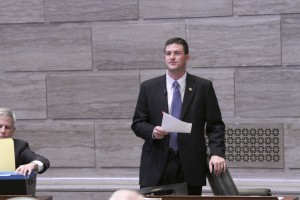JEFFERSON CITY, Mo. — Senate Bill 702 — which allows utility companies to track property tax expenses and transmission fees and apply them to Public Service

Commission hearings — purposefully excludes the largest energy provider in the state, Ameren UE, and only applies to investor owned utility companies with fewer than one million customers.
The bill will affect Missouri’s two other privately owned electric companies — Kansas City Power and Light and Empire District Electric Company. Bill sponsor Sen. Brad Lager, R-Maryville, added this provision because he heard from Ameren’s largest industrial customers would blockade a bill favoring Ameren at any cost.
“From a public policy perspective, I don’t think its right to keep punishing KCP&L and Empire because Ameren can’t get along with their largest customers,” Lager said.
Senate Majority Floor Leader, Ron Richard, R-Joplin, said that he does not think Ameren being excluded from the legislation sets a precedent. He added that Ameren was part of a bill last year specific to their coverage area.

Currently the expenses and fees are not applied until a later date, using figures from previous years, even though the companies pay those expenses that year. This disparity can raise rates because those expenses are two of the most volatile measures, Lager said.
Rep. Doug Funderburk, R-St. Peters, is the chair of the House Utilities Committee. He said that KCP&L purchased a defunct utility company, including its infrastructure. After KCP&L got the infrastructure up and running, the property value skyrocketed.
However, Funderburk pointed out that the utilities cannot be treated as normal businesses because they are monopolies in specific parts of the state. Each company has a suggested rated of return on its investment. A representative from KCP&L admitted that the company had over earned at least one month in 2013.
“I don’t believe that Ameren needs to be treated separately or differently,” Funderburk said. “It at least gives the opportunity that Missouri Legislature can be hostile toward one of the utilities. You’re going to court a competitive environment; who am I going to partner with?”
Currently, there is not an equivalent bill in the house, Funderburk said.
The Public Services Commission, using a several step process for rate hearings, determines the current rates for electric companies. The companies and consumers, represented by Public Council, negotiate at a rate hearing at the PSC and then the PSC sets the rate, usually between the two sides’ projections. Opponents of the bill including Chris Roepe of the Fair Energy Rate Action Fund argued that property tax and transmission fees were favorable to the companies raising rates.
“They don’t want to debate real cost,” Lager said.
PSC spokesperson Kevin Kelly said the department would not comment on ongoing legislation.
The bill will come up for a vote in committee either Monday or Tuesday, Lager said.



